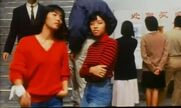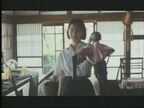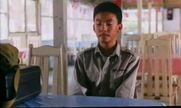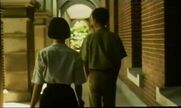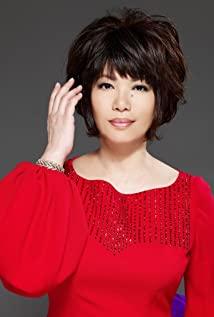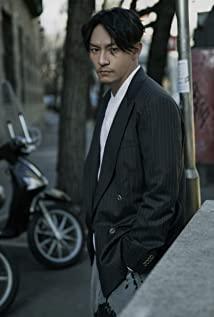First published on the public account "Detective"
ID: ttyingtan
Author: Boss Qian
Please indicate the source
>>>>Summer Memories
The core plot of the story is as the news report said:
A man (Little Four) and a woman (Xiao Ming) fell in love, and in the end he stabbed her to death in a place called Guling Street.
This film is not so much about personal tragedy as it is about making a microcosm of an era.
This has been revealed from the very beginning of the film.
The first scene of the film is at school.
The fourth father was sitting in the office, arguing with someone.
But the man had only one leg stretched out in the painting, and he could only see his voice but not his person.
Xiao Si's father is a straight person, and he will not turn around when he speaks.
Looking at the other side, they were all slapped with official tongues.
Xiao Si's father couldn't fight for her, but he didn't know where to fight with her.
The next shot, the shot is reversed—
Xiao Si sat on the bench in the corridor, his head downcast.
The picture in the previous shot is from the subjective perspective of Xiao Si's eyes.
The two shots have already hinted at the oppression of the parents by an invisible force, and the "little four" who are implicated by it.
Followed by the second.
Father and Xiao Si came slowly from a tree-lined road on bicycles.
It looks like a peaceful and warm scene.
However, with a little attention, you can see a few military vehicles passing by at the end of the long road.
There was also a roar of fighter jets whizzing past overhead.
The invisible power of the previous game was secretly revealed in this game——
Why are there military vehicles and fighter jets?
Because Taiwan is in a period of martial law (the details will be discussed later) .
And the focus of this period, institutions and authority, is invisible.
In addition, the first two scenes basically dominate the core shooting method of the whole film.
There are very few close-ups, because what I want is the characters and the environment.
Very little editing, because what is required is a cold-eyed objective attitude.
Times are the protagonists.
And Xiao Si and his father are just two of the people living in this era.
A dark age.
Abrightersummerday.
>>>>Times
The so-called era is not born out of thin air, but iteratively.
Those things left over from history have been embedded in many details of the film by the director.
In 1895, the Qing government was defeated in the Sino-Japanese War and was forced to cede Taiwan to Japan.
Taiwan began a 50-year-old period of Japanese rule.
In 1945, Japan surrendered and Taiwan returned, and Chen Yi, the second-ranking general of the Republic of China Army, was in charge of taking over and governing Taiwan.
However, he managed Taiwan in a mess, social order was chaotic, and economic development stagnated.
The people complained, and the people were angry.
As a result, the February 28 Incident occurred (Hou Hsiao-hsien's "City of Sadness" tells the story of this period).
All kinds of things made many people even start to miss the life during the Japanese occupation.
This is why some people are singing Japanese songs in the film.
Just because they are not natives of the province, the Xiao Si family cannot understand this feeling.
In 1949, the Kuomintang retreated to Taiwan.
Millions of military and political personnel and ordinary people also came to Taiwan.
The situation for these people is complicated because they face the influence of three cultures:
One is the Chinese culture rooted in the bones;
One is the legacy of Japanese culture;
One is the new American culture that came in because of its economic and military support.
So you can see that the women are still wearing cheongsam when Wang Gou treats guests, the small family is arranged to live in a house built by the Japanese during the Japanese occupation period, the samurai sword used by the gangsters, the eldest sister learns from the Americans to take a shower in the morning, and loves rock music. The Elvis...
These different phenomena that cannot be fought in other places have miraculously appeared together in Taiwan.
As the title card at the beginning of the movie says,
Most people came to Taiwan with the Kuomintang government, but for stability.
However, it backfired.
On May 19 of the same year, in order to consolidate authoritarian rule and eliminate dissidents, the Kuomintang government promulgated the "Taiwan Province Martial Law".
Taiwan entered a period of martial law that lasted 38 years and 56 days.
Dozens of regulatory laws have been enacted to limit the liberties of people under the Constitution.
What is even more terrifying is that during this period, there are often news of people disappearing for no reason or being unjustly imprisoned.
For those with different political views, the Kuomintang government adopted the attitude of "it is better to kill a thousand by mistake than to let one go".
This was the infamous "white terror", which lasted even longer than martial law.
1960, the main year of the film's story.
In one year alone, 126,875 people were withdrawn as "unaccounted for".
How many are really missing? How many are enforced disappearances?
OK.
The "Little Four", and their parents, are living in such a time of panic.
>>>>Parents
The protagonists of this film are mainly foreigners who came to Taiwan with the Kuomintang.
The pressure of the times, first of all, is on the people of this generation.
However, the film depicts not what they were in when they first arrived, but about a decade later.
Ten years later, the Kuomintang's slogan of "counterattack the mainland" has become a joke.
People have become accustomed to tanks driving on the street from time to time, troops passing by, etc.
These people in the film each have their own way of living, but one thing is basically the same.
The Chinese like to say, "Always have some hope in life".
But most of these people are hopeless.
Kind of like an instructor in a school.
Settling in a corner, indulging in the thoughts of hometown, one day counts as one day.
A kind of dog that resembles Xiao Si's father's friend.
Sleek and sophisticated, he knows how to judge the situation.
Seeing that there was no hope of returning to his hometown, he began to spread the relationship, as much as he could make.
A mother like Xiao Ming.
I came with my brothers in the army, but after a long time, I was disliked.
I can only take my daughter around as a maid, relying on others to make ends meet.
This is a type of person who is almost exhausted just by living.
A kind of father like a four-year-old.
Comparing several people, to a certain extent, they are the worst.
Because they uphold the principles and beliefs of life in their hearts.
You can't compare to others in terms of money, and you can't compare to others in terms of power, but there is one thing to be proud of.
Be upright and upright in life, and act righteously.
That is the "fairness" that my father often puts in his mouth.
A play that is often mentioned by netizens-
The four books were right, but they were demerited because they refused to admit their mistakes.
My father came to the school to fight for it, even at the expense of offending the dean.
On the way home, my father gave some teachings to Xiao Si, but in fact, it was also said to myself.
However, this is a society full of injustice from the very beginning.
Unjust government, unjust system, unjust everything, but you are calling for fairness.
If you don't do it, who will you do it?
Before the trial, the father was still fine.
It's nothing more than being nagged by his wife and getting a little angry.
After the interrogation, my father was almost a crippled man, and he was talking all day long, suspicious, and completely devoid of energy.
It's not because of being tortured, but because of this incident that made him understand:
The so-called principles and bottom lines he adheres to, the human nature he believes in,
In the face of the authority and system of the time, it was like a joke at all.
A ghostly judge, caught and released for no apparent reason
>>>>Children
Parents have their parents' fear, and their children have their children's confusion.
That's what gangsters are.
For example, the gangs of the military dependents’ village, as the name suggests, are a group of people living in the military dependents’ village.
Mainly family members who came with the troops. Xiao Ming is one of them.
So she brought Xiao Si to the shooting range.
From the sentence Xiao Si casually said, "No one lives around here", you can know that this is a remote and remote place.
In this way, it is not difficult to understand the situation and behavior of a group of people headed by Shandong.
Living in a place where power outages are commonplace all year round, it is natural to want to invade a small park gang and to make money.
The same goes for small parks.
Just a bunch of kids living near a small park.
The real gangsters are the local gangs that Haney met after fleeing to the south.
Compared with them, the small parks and military villages are like playing at home.
Kind of like the difference between "street gangsters" and "underworld" when we were kids.
Gangsters often force students to take money to eat and drink, but the underworld will have its own principles and bottom lines.
The same goes for those who aren't in gangs.
Like a pony.
As the commander's son, he belongs to a relatively special privileged class.
The old man had never even appeared before, and just reporting his name would make everyone respect him.
But this may also explain why he is a lone wolf in another way.
No one dared to make friends with him, except for Xiao Si, who was also a lone wolf.
It's a pity that he appreciates Xiao Si's sense of loyalty, but after all, he can't understand the thinking of low-level people like Xiao Si.
The conflict between them officially broke out after Xiaoma took Xiao Ming for granted.
The same shot, one is inside the painting, the other is outside the painting.
Not a person in a world at all.
Such as Xiao Ming.
Many people thought she was a scumbag.
But in fact, the film has passed a small number of scenes, and its character and behavior have been fully explained.
Ever since I was a child, I have followed my mother around and lived under the shelter of others, watching people's faces.
And my mother has pinned all her hopes for the future on her.
To put it bluntly, she is not qualified to fall in love.
She's a scumbag, but the premise is that she doesn't seem to have any other choice.
In addition, Xiao Ming's most famous line was uttered before her death:
I'm just like the world, it won't change!
So she has often become synonymous with reality.
But it doesn't seem to be that simple.
Otherwise, why even though she had broken up with Hani, she was still seriously ill after learning of Hani's death?
Do people who really think the world will not change say such lines?
Is she also looking forward to the change of the world?
Does she say this with a kind of laissez-faire temperament?
This understanding seems to be self-evident.
Too bad we can't know anymore.
And our protagonist, Xiao Si.
There is no doubt that he is an idealist.
This is partly because of his nature, partly because of the surrounding environment.
Hani, Xiao Ming, and father correspond to ideals, love, family, or social, private, and family.
For an adolescent boy, this is almost his entire life.
Initially, all three aspects were positive.
Hani appreciates him, and Xiao Ming really likes him.
The most important father told him firmly: "Your future can be determined by your own efforts."
However, we also know the result.
The beliefs and values established in the three aspects are almost vulnerable in the face of injustice.
The worst, perhaps, comes from the family.
The movie does not show the situation of Xiao Si's family at the beginning, but follows Xiao Si after fighting with the gang.
After returning home, there is also a shot of the light at home compared with the pale night outside the house.
This means that it is already obvious - home is the last safe haven for the little four.
However, this house has been slapped to pieces by the invisible big hands of the authoritarian.
This white "infiltrated" into the home by chance
At the beginning of the movie, Xiao Si stole a flashlight and often carried it with him.
It is because of false short-sightedness that you cannot see things clearly, and it may not be understood as a hope for truth.
The process of Xiao Si's collapse is actually a process of slowly discovering the truth of this world.
He walked into the blood-washed pool hall with a flashlight, almost a naked metaphor—
He wanted to see the world clearly, but in the end he realized that it was better not to see it.
Just like in the opening scene, when the light bulb is turned on, the screen is full of blood, which is so cruel and terrifying that it is suffocating.
So in the end, Xiao Si returned the flashlight to the studio.
Although he said he was going to block the pony, he should have made up his mind to die and wanted to change something.
The knife he was going to use to block people was originally a relic used by others when they committed suicide.
It stands for purity, it stands for justice.
However, by accident, I met Xiao Ming's big truth.
Almost at the moment of hearing this sentence, Xiao Si instinctively stabbed with a knife.
While poke, while scolding: You are useless! shameless!
Are you scolding Xiaoming?
Rather, it was more like scolding himself.
Why?
The film didn't say it explicitly, but I think Xiao Si was probably shocked when he heard it, that he actually agreed with this sentence in his heart.
Angry because of his powerlessness, he stabbed Xiao Ming.
In fact, he also stabbed himself.
>>>>narrative and audiovisual
This is a movie that needs to be watched at least twice.
Not to mention anything else, quite a few scenes and plots in the film were deliberately repeated twice as a comparison.
For example, the two encounters between Xiao Si and Xiao Ming on Guling Street;
For example, Xiao Si was punished twice and walked with his father twice;
Even a simple second sister goes out.
The same mirror position and the same action have new meanings due to the different situations of the characters.
In addition, the film also hides a lot of images and techniques in shooting, which are worth pondering over and over again.
For example, in the fourth scene of the movie, Elvis and Xiao Si peeked at the filming on the beam on the set.
It starts with a big panorama of the set.
According to the normal routine, the next shot should cut the frontal shots of these two people.
However, what is interesting is that the movie has a nesting doll scene where the mantis catches the cicada and the oriole.
This is interesting.
They're watching the set, so who's watching them?
After noticing this, going to see many scenes in the film will have a new meaning.
A transition like here:
Like the pan here.
Xiao Si always wanted to be an outsider, but was always forced to be an insider.
Another example is that the fourth time was fined a second time.
Seeing his father bowing his head and shrugging his shoulders to be eliminated by the dean, Xiao Si's grievances grew.
The film also hinted that Xiao Si was going to hit the dean with a bat through editing, but in the end, he only broke the light bulb with a bang.
The brightness in the office, the lens has not changed at all.
Only the wires dangling the light bulbs dangled in vain.
Looking at the next shot, it is even more bizarre and oppressive——
Many teachers and instructors in the office stared straight at this side, and the light bulbs on their heads were dazzlingly bright.
When you look back at this scene after knowing the result of Xiao Si's failure to resist, there will be a sense of fateful sadness.
I took Xiaoming on the set, but I couldn't find her;
The tape recorder representing the United States mixed with the radio that broadcasts the official news, but it was broken;
Hani came over when everyone stood in awe, like a living person walking into a frozen time and space;
The signature on Xiaosi's suicide note cannot be read by adults...
There is, really, too much to read and play with.
And this movie is amazing, even if you don't pay attention to these things, you can still watch it very well.
In terms of pure movie scene scheduling, this film has almost perfected four words:
Simple and efficient.
The scheduling of this game is purely based on Hani's position, which also coincides with his status.
Not to mention the story.
Two generations of people, dozens of characters appear in turns, but all of them are impressive.
The story seems complicated, but it happens in an orderly and interlocking manner.
And all these branches, all the characters, are not idle, and have a direct or indirect relationship with Xiao Si.
All I can say is, absolutely.
In addition, this film has a particularly interesting point, because it often occurs in such scenes-
People who have no role in this scene still appear in the scene.
Generally, it exists as a background blur.
This also coincides with the director's purpose.
What he wanted to shoot was this era.
The fate of countless people has been quietly changed because they came to Taiwan.
He just focused on the little four family.
>>>>Why
The ending of the film is actually quite pessimistic.
Xiao Si has been in prison for a long time.
After a long time, everyone has started a new life and continued to live without sorrow or joy.
One day during cleaning, the younger sister accidentally kicked the radio, but instead fixed the radio.
It happened to broadcast the list of college admissions for the new year, which echoed the admission list of the first four and his father.
Mother was drying clothes when she suddenly stared at Xiao Si's clothes in her hands.
She was probably thinking, if Xiao Si had joined the day department, would it be possible for her to appear on this list?
Then study abroad, and get away from this nonsense.
She was probably thinking, how could such a good family become like this?
However, if there is no if, she will not be able to figure it out.
That's why Yang Dechang took pictures for them that they couldn't see themselves.
So, this ending seems promising again.
Juvenile love murder, at best, it is just a matter of discussion after dinner.
But there are still people who occasionally think of him, that sunny summer, and that some people lived in that era.
At the time of general cleaning, at the time of another year of school entry, at the time of daze, at some point.
This person may be the relatives and friends of the teenager, or it may be you and me who are fortunate enough to see this movie.
Text/Boss Qian
View more about A Brighter Summer Day reviews



